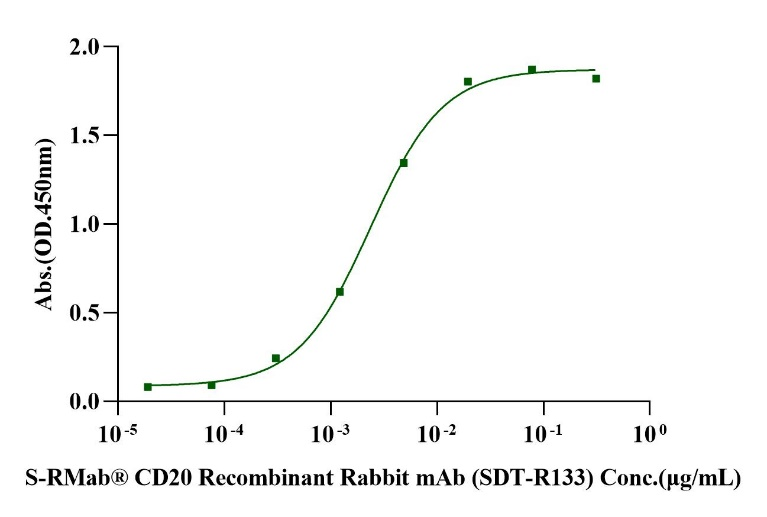Full length, with Flag tag at N-Terminal, and His tag at C-Terminal
35.3 kDa
25 mM Tris, pH 7.5, 150 mM NaCl, 0. 02 % DDM.
·6 months from date of receipt, -60 to -80 °C as supplied.
·about 3 days in 2 to 8 °C.
·Please avoid repeated freeze-thaw cycles.
1. Rougé L, Chiang N, Steffek M, et al. Structure of CD20 in complex with the therapeutic monoclonal antibody rituximab[J]. Science, 2020, 367(6483): 1224-1230.
CD20 is a 33-37 kDa non-glycosylated protein present on the surface of normal and malignant B lymphocytes and is a member of the MS4A (membrane-spanning 4-domain family A) protein family. The CD20 protein comprises four hydrophobic transmembrane domains, one intracellular domain, and two extracellular domains (a large loop and a small loop), with both the N- and C-termini located within the cytosol. CD20 is associated with several key molecules, including the major histocompatibility complex class II (MHCII), CD40 molecule, B-cell receptor (BCR), and the C-terminal src kinase-binding protein (CBP). CBP interacts with Src kinases such as LYN, FYN, and LCK.
A deficiency in CD20 has been shown to result in a reduced number of circulating memory B cells, decreased isotype switching of immunoglobulins (Ig), and lower IgG antibody levels. It is also linked to various pathophysiological diseases and disorders.
CD20 plays a crucial role in multiple physiological processes and is thus a promising therapeutic target. The CD20 protein product has the potential to enhance drug discovery efforts in related fields.
2μg (R: reducing condition, N: non-reducing condition).
The purity of CD20 His&Flag tag Protein, Human (Detergent) is greater than 85% as determined by SEC-HPLC.
Immobilized S-RMab® CD20 Recombinant Rabbit mAb (SDT-R133) (Cat. No. S0B2158) at 1μg/mL (100μL/well) can bind CD20 Flag&His tag, Human (Cat. No. UA060019) with EC50 of 8.12-9.46ng/mL.

Immobilized CD20 Flag&His tag, Human (Cat. No. UA060019) at 5μg/mL (100μL/well) can bind S-RMab® CD20 Recombinant Rabbit mAb (SDT-R133) (Cat. No. S0B2158) with EC50 of 1.90-2.94ng/mL.